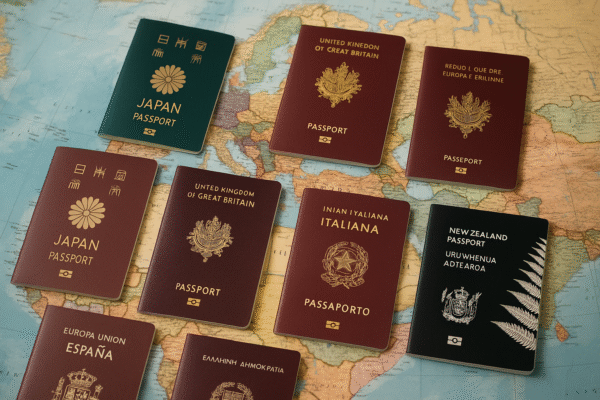In 2025, global passport power remains a critical indicator of diplomatic strength, economic alliances, and international mobility. According to the latest Henley Passport Index, Japan and South Korea continue to dominate the rankings, alongside several European nations like Germany, France, Italy, and Spain. These countries provide their citizens with visa-free or visa-on-arrival access to nearly all major global destinations, reinforcing their status as the holders of the most powerful passports in the world.
Global Travel Leaders: The Top 10 Most Powerful Passports of 2025
1. 193 Visa-Free Destinations: Japan and Singapore
Topping the chart once again, Japan and Singapore offer access to 193 destinations without the need for a visa. This remarkable freedom is attributed to decades of proactive foreign diplomacy, trade agreements, and participation in multilateral frameworks such as the ASEAN and bilateral arrangements with the EU and North America. Japanese and Singaporean passport holders enjoy seamless travel across Europe, the Americas, most of Asia, and Oceania.
2. 190 Visa-Free Destinations: South Korea, France, Germany, Italy, and Spain
Five countries tie for the second position. South Korea’s strategic international presence, from diplomatic outreach to cultural soft power (like K-culture), plays a major role in its mobility rise. France, Germany, Italy, and Spain, as leading members of the Schengen Area, benefit from their long-standing international partnerships, EU treaties, and widespread embassy networks.
3. 189 Visa-Free Destinations: Finland, Sweden, Netherlands, Luxembourg, Austria, Ireland, and Denmark
Northern and Central European nations fill the third spot. Their inclusion in the European Union and adherence to human rights standards, visa reciprocity, and economic agreements allow citizens to travel nearly anywhere with ease. These countries also rank high in global diplomacy and development assistance indexes.
4. 188 Visa-Free Destinations: Belgium, Czechia, New Zealand, and Norway
New Zealand joins this European-heavy category, thanks to its stable governance, peace-oriented foreign policy, and long-standing Commonwealth affiliations. EU members continue to benefit from intra-regional agreements and strong global diplomatic ties.
5. 187 Visa-Free Destinations: Greece, Switzerland, and Malta
Despite economic fluctuations in recent years, Greece retains strong EU backing. Switzerland, while not an EU member, is deeply integrated through Schengen and bilateral treaties. Malta, a small but diplomatically active nation, enjoys access to a wide range of destinations through EU and Commonwealth channels.
6. 186 Visa-Free Destinations: United Kingdom
The UK, although affected by Brexit, holds steady in sixth place due to bilateral agreements with over 180 countries and historic ties through the Commonwealth of Nations. Its citizens continue to enjoy visa-free travel across much of North America, Asia, and the Middle East.
7. 185 Visa-Free Destinations: Australia, Poland, Hungary, and Estonia
Australia, with its globally respected passport, maintains strong access across the Americas, Europe, and Asia-Pacific. EU nations like Poland and Hungary are seeing enhanced mobility through expanded regional partnerships. Estonia’s digital diplomacy also plays a role in maintaining its passport strength.
8. 184 Visa-Free Destinations: United Arab Emirates and Canada
The UAE has made the most significant progress over the past decade—climbing more than 30 positions since 2015. Thanks to aggressive diplomatic outreach and regional cooperation, Emirati citizens can now access 184 countries without a visa. Canada, with its extensive multilateral partnerships and global reputation for inclusivity, remains one of the most mobile passports globally.
9. 183 Visa-Free Destinations: Croatia, Latvia, Slovakia, and Slovenia
Newer EU members like Croatia (which joined the Schengen Area in 2023), Latvia, Slovakia, and Slovenia now enjoy increased mobility due to their deeper integration into European political and economic systems.
10. 182 Visa-Free Destinations: United States, Lithuania, and Iceland
Despite political changes and visa reciprocity debates, the U.S. passport continues to offer access to 182 countries. Lithuania and Iceland, small but highly developed democracies, benefit from European integration and global cooperation frameworks.
Significant Movers in 2025
- India now ranks 77th, granting access to 62 destinations. Improvements in international diplomacy and global business relations have contributed to its rise. According to the Indian Ministry of External Affairs, ongoing negotiations for visa waivers with the EU and GCC may boost future rankings.
- China sits at 60th, with access to 85 destinations. Although global influence has grown, limited access to Schengen countries and North America continues to hinder its passport strength.
- Saudi Arabia added four new destinations in 2025, bringing its total to 91 countries. This improvement follows major reforms under Vision 2030 and normalization of diplomatic ties with key nations.
- Afghanistan remains at the bottom of the index, with visa-free access to just 25 countries. Prolonged political instability continues to affect international travel arrangements and foreign relations.
What Makes a Passport Powerful?
According to Henley & Partners, which compiles the Henley Passport Index using data from the International Air Transport Association (IATA), a passport’s power is determined by the number of countries its holders can enter without a prior visa. The score includes both visa-free and visa-on-arrival destinations.
Other contributing factors include:
- Participation in multilateral visa-free zones (e.g., Schengen Area)
- Strong foreign diplomacy and trade relations
- Low security and immigration risks associated with travelers
- High national economic and governance indices
Conclusion: The Future of Global Mobility
As geopolitical alliances evolve and travel regulations shift post-pandemic, the power of a passport is more important than ever. Citizens from countries with diplomatic agility and stable governance enjoy unmatched access to the world.
With Asia and Europe continuing to lead the rankings, travelers from nations like Japan, South Korea, Germany, and France benefit from extraordinary mobility. Meanwhile, rising powers like the UAE, India, and Saudi Arabia highlight how dynamic foreign policy can redefine global access in the coming years.
For more travel news like this, keep reading Global Travel Wire



















